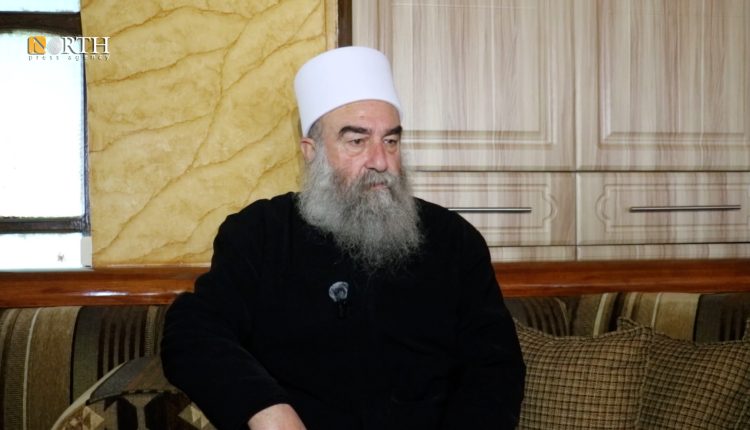Syria’s Druze Leader Rejects Reconciliation with Damascus
By Kardo Roj
SUWAYDA, Syria (North Press) – Sheikh Hikmat al-Hijri, the spiritual leader of Syria’s Druze community, reaffirmed on Thursday his rejection of any reconciliation with the Syrian government, calling it “extremist” and holding it responsible for the country’s crisis.
“There is no agreement and no reconciliation with the government in Damascus,” al-Hijri stated during a gathering at his residence in the town of Qanawat, according to North Press correspondents. He stressed that the current government is “wanted for international justice” and that any compromise with it is unacceptable.
His comments reflect deepening tensions between the Druze-majority Suwayda governorate and the Syrian government, as local demands for political and economic reforms continue to grow.
Al-Hijri’s remarks came a day after he met with a delegation of political and civil activists from Suwayda, alongside the province’s governor, Mustafa al-Bakour. The meeting concluded with a memorandum of understanding, though specific details remain unclear.
In his speech, al-Hijri emphasized the need for justice at both national and international levels. “We are at a critical moment in history—either we exist with dignity or we do not exist at all,” he said, stressing that his community will pursue policies that align with its priorities and interests.
He also expressed disappointment in certain individuals from Suwayda who continue to support the Syrian government, accusing them of “selling the blood and dignity of their own people.”
Growing Discontent in Southern Syria
Suwayda, a region historically known for its relative autonomy and Druze-majority population, has witnessed growing anti-government sentiment over the past years. Protests demanding political change and economic relief have intensified, particularly in response to worsening living conditions and government neglect.
The Autonomous Administration of North and East Syria (AANES), which governs regions under the control of the Syrian Democratic Forces (SDF), has closely followed developments in Suwayda, as both areas share concerns over governance, decentralization, and security. While the AANES and the Suwayda movement operate independently, both have called for greater regional autonomy and democratic governance within Syria.
As Suwayda’s leadership distances itself further from Damascus, the political landscape in southern Syria remains uncertain. Al-Hijri’s remarks signal a continued rift that could further weaken government influence in the region. Meanwhile, as protests and local governance initiatives gain momentum, observers question whether Suwayda will follow the path of northeast Syria in seeking greater autonomy.
With growing demands for political change, Suwayda remains a critical flashpoint in Syria’s ongoing crisis, potentially reshaping the country’s future governance.

